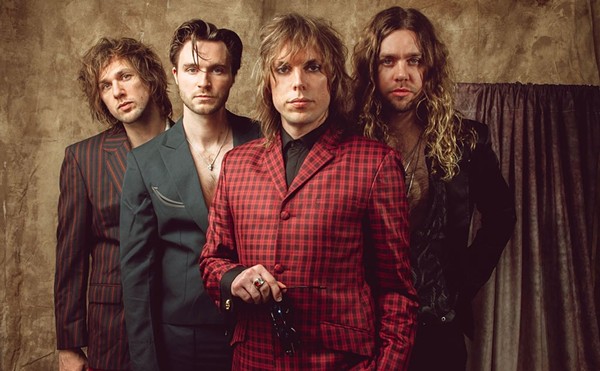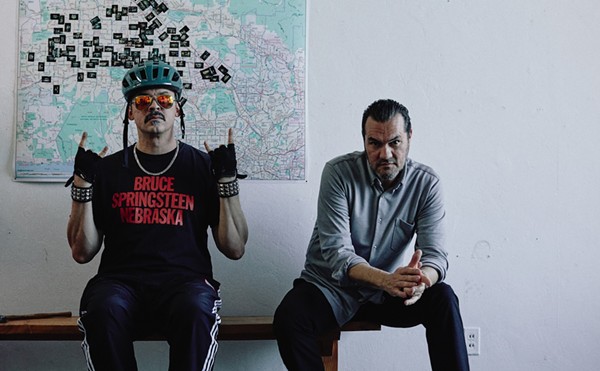In Advance of his Grog Shop Show, Singer-Songwriter Sondre Lerche Discusses Finding Inspiration in Juxtaposition
By Johnny Cook on Thu, Apr 13, 2017 at 2:41 pm
[
{
"name": "Ad - NativeInline - Injected",
"component": "38482495",
"insertPoint": "3",
"requiredCountToDisplay": "5"
},{
"name": "Real 1 Player (r2) - Inline",
"component": "38482494",
"insertPoint": "2/3",
"requiredCountToDisplay": "9"
}
]
Norwegian musician Sondre Lerche has had a career that most artists would kill for. In his early thirties, he released eight studio albums, composed a film soundtrack and embarked upon numerous international tours. He got his start in the early 2000s, making the sort of smooth indie pop you would expect to hear in a coffeeshop or a bookstore, but after his marriage dissolved in 2013, he started to reinvent his music and style.
Lerche isn’t known for making dramatic changes from album to album, but his new album, Pleasure, features electronic sounds and unusual arrangements. The new release builds on Lerche’s jazz and pop background while drawing upon electronic influences from the '70s and '80s.
“Pleasure is a hell of a ride,” Lerche says via phone interview from Norway. “When you first hear it, there’s a lot going on, and there’s a lot of deliberately bombastic sounds and emotions, so it can take some adjustment, depending on where you’re coming from. [The album] reveals itself slowly, and sometimes, I’m the last one to see the big picture and see what it’s become. So, it’s exciting to share it with people and hear their opinions.”
Pleasure can be immediately jarring for both long-time listeners of Lerche’s work and for new fans. Opening track “Soft Feelings” starts with a pounding synth line reminiscent of New Order before Lerche’s wistful voice interjects. The next track, “I’m Always Watching You,” sounds like vintage Madonna viewed through a funhouse mirror.
The electronic sounds are a system shock for a musician that previously just used his voice and an acoustic guitar. Much of album plays up and highlights the contrast between the cold, robotic synths, and Lerche’s fluid, organic vocals.
“It has some of that tension that you have in live performance where there’s a real risk of everything falling apart. I wanted the record to have that, and so in that sense, I feel like it reflects my personality more,” Lerche explains. “For people who know me from other records or just records from the past, it may seem like a departure, but people who have seen me in concert will recognize that beast, in a sense. The ‘madman’ side of what I do is more accented on this record, and it was a challenge to capture that. It almost felt like a split personality getting this record to come together.”
In a sense, the album feels like it has a split personality as well. It uses the musical and structural formula for a conventional pop song, but the emotional and lyrical content is much darker.
“It’s definitely a juxtaposition I’m just drawn to naturally, and this album nakedly represents the last three years of my life — a very turbulent, strange, exciting, fun, sort of limbo-like existence,” Lerche says about the contrast between his music and his lyrics. “It makes for a strange result, in the sense that it’s probably a little too wild for the charts, and the lyrics don’t adhere to the formula that commercial pop does. But it’s something that excites me and that excites me to share. It’s my way of sharing my own take on all of these things. That’s not to say that other pop music is better or worse, but this is what happens when it goes through my body and my life.”
Whereas Lerche’s previous albums were mostly acoustic, making them easier to recreate live, Pleasure has a lot of instrumentation, so Lerche has had to make choices about his live show that haven’t been an issue before.
“When we do it live, I need to keep it very immediate, and simple. We have to represent a lot of these sounds, but I don’t want any sequence thing, or clicks, I don’t want to constrain us or confine us as musicians, so everything is played live. Everything is loose. It’s not like we have a lot of pre-set tracks,” Lerche says. “I need to be spontaneous and free in the moment, even when we have this kind of music with a lot of electronic sounds. I need to be free, basically, and that freedom is something that the musicians that I play with try to provide me with.”
It’s unusual to think of an electronically based album as having space for improvisation, but for Lerche, that’s the space he’s trying to tap into.
“I’m getting to the point where I feel the rawness of the live performance,” he says. “To me, it has much more of the rawness of live performance and the dissonance that I play around with a lot. It has a lot of those elements, even though it’s put together in a deliberate way on record.”
The other new feature of Pleasure is the lyrical content — much of the album explores sexuality, masculinity, and questions of gender roles and gender identity, which hasn’t been previously been a concern for Lerche’s songs.
“I’ve tried for many years to talk about sexuality, and to talk about my gender, and shame for my gender, and feeling different from others. It’s the first time I’ve actually succeeded in expressing that side of myself. It took me a lot of years,” he says. “I guess I’ve cracked my own internal code, in a sense, by including that part of myself — my masculinity, my sexuality, and my gender in my music. There were hints of it in Please, but in Pleasure, I feel I’m strong enough to explore masculine vulnerability, and different kinds of intimacy. And to me, that’s a huge step. It’s simply a different phase of my life, where suddenly, all these things just became a part of my vocabulary, musically and lyrically.”
All the twists and turns on the album can be shocking at first. Fans of Lerche’s older albums might have some reservations about embracing a different version of his music, but for Lerche, he can’t help but respond to his own needs.
“I owe it to my audience to be true to my own views and my own life. I’m not a model or an actor who performs a role given to me by others. I’m performing my own role that also corresponds to my own life,” he explains. “I’m thrilled when longtime followers and new fans embrace what I’m doing now, but I totally respect that my needs as a musician won’t always correspond to all of my fans. That’s the price you pay for doing exactly what you want as an artist and it would be disrespectful for me to not do that.”
Sondre Lerche, By Light We Loom, 9 p.m. Friday, April 21, Grog Shop, 2785 Euclid Heights Blvd., Cleveland Heights, 216-321-5588. Tickets: $16 ADV, $18 DOS, grogshop.gs
Lerche isn’t known for making dramatic changes from album to album, but his new album, Pleasure, features electronic sounds and unusual arrangements. The new release builds on Lerche’s jazz and pop background while drawing upon electronic influences from the '70s and '80s.
“Pleasure is a hell of a ride,” Lerche says via phone interview from Norway. “When you first hear it, there’s a lot going on, and there’s a lot of deliberately bombastic sounds and emotions, so it can take some adjustment, depending on where you’re coming from. [The album] reveals itself slowly, and sometimes, I’m the last one to see the big picture and see what it’s become. So, it’s exciting to share it with people and hear their opinions.”
Pleasure can be immediately jarring for both long-time listeners of Lerche’s work and for new fans. Opening track “Soft Feelings” starts with a pounding synth line reminiscent of New Order before Lerche’s wistful voice interjects. The next track, “I’m Always Watching You,” sounds like vintage Madonna viewed through a funhouse mirror.
The electronic sounds are a system shock for a musician that previously just used his voice and an acoustic guitar. Much of album plays up and highlights the contrast between the cold, robotic synths, and Lerche’s fluid, organic vocals.
“It has some of that tension that you have in live performance where there’s a real risk of everything falling apart. I wanted the record to have that, and so in that sense, I feel like it reflects my personality more,” Lerche explains. “For people who know me from other records or just records from the past, it may seem like a departure, but people who have seen me in concert will recognize that beast, in a sense. The ‘madman’ side of what I do is more accented on this record, and it was a challenge to capture that. It almost felt like a split personality getting this record to come together.”
In a sense, the album feels like it has a split personality as well. It uses the musical and structural formula for a conventional pop song, but the emotional and lyrical content is much darker.
“It’s definitely a juxtaposition I’m just drawn to naturally, and this album nakedly represents the last three years of my life — a very turbulent, strange, exciting, fun, sort of limbo-like existence,” Lerche says about the contrast between his music and his lyrics. “It makes for a strange result, in the sense that it’s probably a little too wild for the charts, and the lyrics don’t adhere to the formula that commercial pop does. But it’s something that excites me and that excites me to share. It’s my way of sharing my own take on all of these things. That’s not to say that other pop music is better or worse, but this is what happens when it goes through my body and my life.”
Whereas Lerche’s previous albums were mostly acoustic, making them easier to recreate live, Pleasure has a lot of instrumentation, so Lerche has had to make choices about his live show that haven’t been an issue before.
“When we do it live, I need to keep it very immediate, and simple. We have to represent a lot of these sounds, but I don’t want any sequence thing, or clicks, I don’t want to constrain us or confine us as musicians, so everything is played live. Everything is loose. It’s not like we have a lot of pre-set tracks,” Lerche says. “I need to be spontaneous and free in the moment, even when we have this kind of music with a lot of electronic sounds. I need to be free, basically, and that freedom is something that the musicians that I play with try to provide me with.”
It’s unusual to think of an electronically based album as having space for improvisation, but for Lerche, that’s the space he’s trying to tap into.
“I’m getting to the point where I feel the rawness of the live performance,” he says. “To me, it has much more of the rawness of live performance and the dissonance that I play around with a lot. It has a lot of those elements, even though it’s put together in a deliberate way on record.”
The other new feature of Pleasure is the lyrical content — much of the album explores sexuality, masculinity, and questions of gender roles and gender identity, which hasn’t been previously been a concern for Lerche’s songs.
“I’ve tried for many years to talk about sexuality, and to talk about my gender, and shame for my gender, and feeling different from others. It’s the first time I’ve actually succeeded in expressing that side of myself. It took me a lot of years,” he says. “I guess I’ve cracked my own internal code, in a sense, by including that part of myself — my masculinity, my sexuality, and my gender in my music. There were hints of it in Please, but in Pleasure, I feel I’m strong enough to explore masculine vulnerability, and different kinds of intimacy. And to me, that’s a huge step. It’s simply a different phase of my life, where suddenly, all these things just became a part of my vocabulary, musically and lyrically.”
All the twists and turns on the album can be shocking at first. Fans of Lerche’s older albums might have some reservations about embracing a different version of his music, but for Lerche, he can’t help but respond to his own needs.
“I owe it to my audience to be true to my own views and my own life. I’m not a model or an actor who performs a role given to me by others. I’m performing my own role that also corresponds to my own life,” he explains. “I’m thrilled when longtime followers and new fans embrace what I’m doing now, but I totally respect that my needs as a musician won’t always correspond to all of my fans. That’s the price you pay for doing exactly what you want as an artist and it would be disrespectful for me to not do that.”
Sondre Lerche, By Light We Loom, 9 p.m. Friday, April 21, Grog Shop, 2785 Euclid Heights Blvd., Cleveland Heights, 216-321-5588. Tickets: $16 ADV, $18 DOS, grogshop.gs
Tags:
SCENE Supporters make it possible to tell the Cleveland stories you won’t find elsewhere.
Become a supporter today.
Scroll to read more Music News articles
Newsletters
Join Cleveland Scene Newsletters
Subscribe now to get the latest news delivered right to your inbox.












